Yes Farm is a 1.5-acre plot that sits along the I-5 in Seattle, WA, where gardeners of all ages and skill levels come together to tend to the earth and grow nutritious produce for themselves and the community. With skyscrapers and cranes reaching into the sky above and cars flying past on the freeway below, the greenspace is a welcome break from the surrounding city center. And while growing food on the side of Washington’s busiest highway is exceptional, this urban farm stands for so much more. It’s operated by the Black Farmers Collective, which strives to create a black-led, sovereign food system. Yes Farm is about celebrating black leadership, knowledge, and ideas while offering a safe space for people of color to learn how to grow.
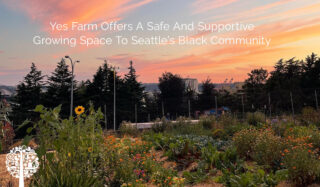
“We collaborate with others in the food system to support and encourage them,” explains Ray Williams, managing director of the Black Farmers Collective and Yes Farm. “We share and direct folks to resources and opportunities. If you look at your work on the farm, in the kitchen, or at the market as part of a system, you can support these pieces and the whole system. We are creating relationships built on trust, action, and results.”
How It Began
The Black Farmers Collective began to support Black growers in Seattle. Looking for ways to boost urban gardening, the collective responded to an opportunity from the Seattle Housing Authority to turn the freeway right of way into a growing space. Located in the Yesler neighborhood, Yes Farm was born. But Williams explains that the farm’s name also represents how the collective responds to others; they are open and welcoming to all ideas and possibilities.
“We strive to create a welcoming space where all identities feel welcome,” he says. “Friendly, respectful, and a place for growth and liberation.”
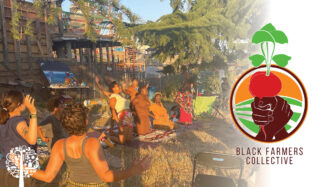
The Black Farmers Collective also runs Small Axe Farm, a four-acre plot in the Sammamish Valley just outside Woodinville. Named after the Bob Marley song about working against an oppressive system, Small Axe is dedicated to teaching and supporting new BIPOC farmers by providing access to land, infrastructure, and business and farm training resources.
Black History And Farming
With the Yes Farm and Small Axe growing initiatives, the collective hopes to tap into the deep-rooted farming history of the Black and Indigenous communities. Their ancestors were exploited for their growing skills; they aim to help people of color reclaim and share their gardening know-how, empowering communities to be self-reliant and physically and mentally healthy.
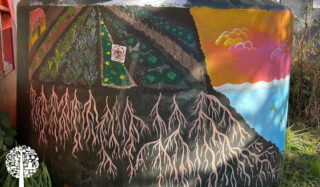
“The story of Black farming is the story of American history,” says Williams. “The stolen African people brought over had many skills. Growing rice was one of them, and the food they grew fed and enriched our nation. Black people in America were not just laborers; they were innovators. For example, G. W. Carver with regenerative soil practices and value-added products; Booker T. Whatley with regenerative farming and farm business, and many others. Black farmers fed and housed the students of Freedom Summer, which lit a spark in the Black Civil Rights movement.”
Healthy Growing
Various fruits and vegetables grow at both of the collective’s farms. At Yes Farm, volunteers and community members have built raised beds, a polytunnel, and, most recently, terrace gardens, the traditional agricultural practice of using hillsides for growing. Terrace gardens maximize space, help retain stormwater in the soil, and reduce erosion and runoff, leading to more sustainable irrigation practices. Corn, squash, tomatoes, cucumbers, and chard grow beautifully at Yes Farm. The harvest is distributed amongst the community, small markets, and hunger relief organizations. Small Axe Farm grows a broader variety of vegetables and distributes the food at farmers’ markets, restaurants, and food aggregators.
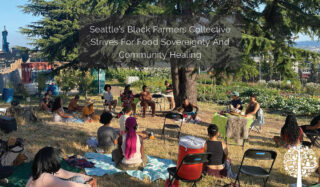
The farms follow organic growing practices to help regenerate the soil and build a healthy ecosystem that nourishes the plants and the people. For example, Yes Farm has ventured into growing mushrooms to eat and help break down the toxins in the soil caused by urban pollution and stormwater runoff. With every growing experiment and gardening project, the Black Farmers Collective is helping change people’s vision of the average American farmer, which doesn’t typically include people of color.
“Part of my work was to change that vision,” Williams explains. “We need to promote and support those Black and Brown farmers out there and encourage young people to see themselves in those roles.”
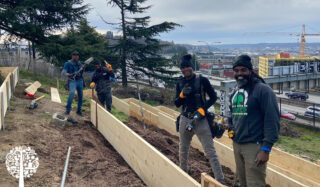
The collective will continue this critical work by hosting workshops throughout the spring and community-building work parties on Saturdays. At Yes Farm, the garden space is expanding, and neighbors will be invited to cookouts and educational events. Small Axe Farm is excited to host guest farmers and support small growers and food system actors. The hope is to see Seattle’s Black farming community grow alongside the food and flowers, leading to food justice, social and economic empowerment, and a general sense of community healing.
“Farming is hard work; community organizing is hard work,” says Williams.
“But knowing you are supporting the young people in the community and our community’s physical, spiritual, and economic health is very rewarding.”
To find out how you can support the Black Farmers Collective, visit blackfarmerscollective.com.